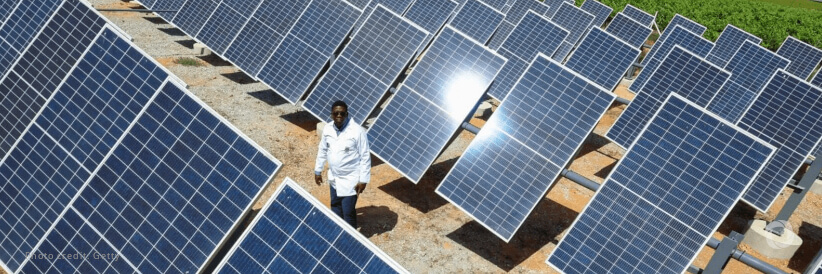With close to 600 million people in Sub-Saharan Africa still living without electricity, the Mission 300 program, an initiative led by the World Bank Group and the African Development Bank, aims to connect 300 million people to the electricity grid by 2030, while also facilitating the transition to clean energy. AFD has committed €1 billion to support this program.
A lack of access to electricity or a stable grid can have major knock-on effects in terms of health, education, and water, and, inevitably, complicates the provision of basic public services. Sub-Saharan Africa is home to 80% of the global population without access to electricity, with the majority of these people living in rural areas.
The Mission 300 Africa Energy Summit, to be held on January 27-28 in Tanzania, will be attended by heads of state, development partners, and civil society representatives to advance the necessary reforms, raise financing,g and foster partnerships to accelerate electricity access in Africa.
“We are delighted to be working once again with the African Development Bank and the World Bank Group–of which AFD Group is a primary partner–to provide 300 million Africans with access to electricity by 2030. This is an investment of solidarity that will help these countries to align their development pathway with climate targets and the Sustainable Development Goals,” says Rémy Rioux, Chief Executive Officer of AFD Group.
Supporting access to electricity and clean cooking
AFD has pledged support of €1 billion between now and 2030 to help Mission 300 achieve its goals. “This commitment illustrates that access to electricity has long been a priority for AFD Group,” says Nicolas Guichard, Head of AFD’s Energy Division.“It supports AFD’s other initiatives to promote clean and efficient cooking.”
Since May 2024, AFD has been responsible for implementing the €100 million in financing granted by the French government to support the shift to more sustainable cooking practices. Clean cooking is a key issue, given that a billion people in Sub-Saharan Africa still use wood and coal as fuel for cooking. These energy sources are highly polluting and have serious consequences for health, particularly among women and children, who are disproportionately affected by household air pollution. These practices also contribute to the depletion of natural resources and loss of biodiversity.
Targeted action for greater impact
What is the real-life impact of projects supported by AFD Group? In 2023, AFD’s initiatives provided 1.7 million Africans with access to sustainable electricity. AFD implements targeted operations to meet the specific needs of its partners, tailored to varying local contexts, thus maximizing their impact and reaching large numbers of beneficiaries.
“AFD makes the final beneficiaries the central focus of its actions, by targeting the specific needs of local populations,” says Pauline Larat, Deputy Head of AFD’s Energy Division. “We prioritize the most vulnerable populations, essential public services, like schools and healthcare centers, and local businesses. Our aim is to stimulate economic growth by adjusting tariffs and to actively promote gender equality.”
For example, Guinea’s electricity grid has been rehabilitated and extended to supply over 150,000 inhabitants of Conakry with electricity access. In the Democratic Republic of the Congo, a mini-grid powered by two solar plants has been constructed, giving 100,000 inhabitants of Kabinda access to a reliable and sustainable power supply. In Tanzania, a mass electrification program has been implemented, connecting 450,000 people in rural areas to the electricity grid. In Kenya, mini-grids powered by renewable energy have been installed, which now provide 100,000 inhabitants with access to electricity.
A group-wide approach
AFD draws on the expertise and financial tools of its various entities to address electrification challenges in Sub-Saharan Africa: AFD finances and assists with the expansion of electricity grids, while supporting governments and public enterprises; Proparco specializes in financing private, off-grid companies (particularly mini-grids); while Expertise France helps governments to implement technical assistance programs.
Through initiatives like the Digital Energy Challenge, supported by the European Union and ADEME (French Agency for Ecological Transition), AFD also promotes innovation and the use of digital technology to increase access to electricity, particularly in remote areas.
Lastly, AFD is exploring a new strategy that draws on the strength of local financial systems (local banks, insurance companies, microfinance institutions, etc.) to support electricity access. These organizations play a key role in financing productive activities that boost electricity demand, thus making investment in energy infrastructure more attractive. AFD has invited its Mission 300 partners to attend a session on this issue at the 2025 FiC Summit to be held in Cape Town in late February, to discuss how public development banks can accelerate the pace of electricity access.

